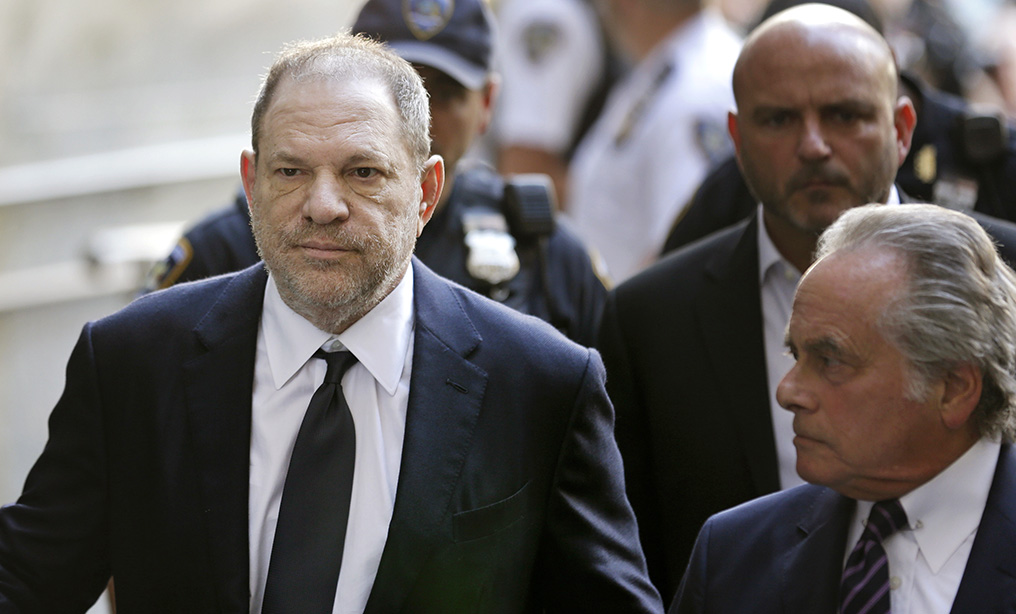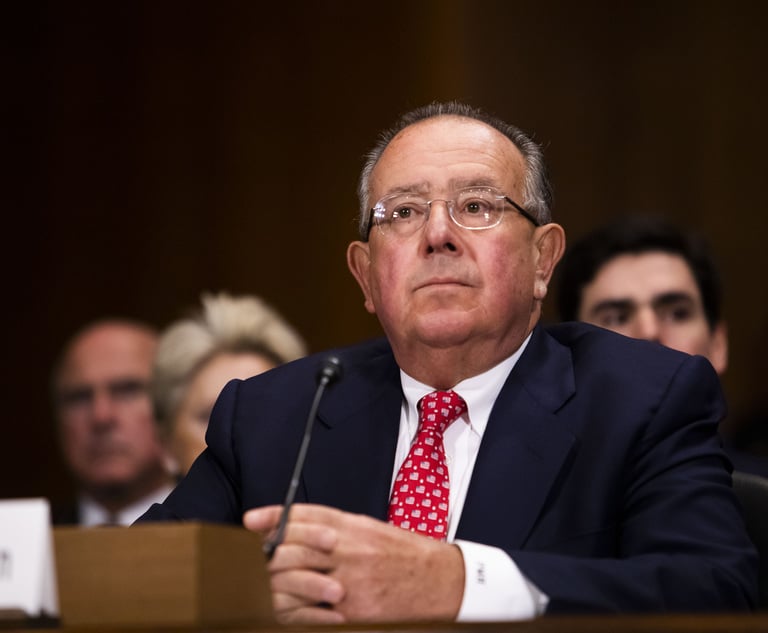Brafman's Withdrawal From Weinstein Case Exposes Tensions That Come With High-Profile Clients
The news this week that Benjamin Brafman would withdraw as defense counsel for former movie titan Harvey Weinstein in his sexual assault case called to mind for some attorneys the challenges they face when representing powerful clients who are used to having it their way.
January 17, 2019 at 05:51 PM
6 minute read
 Harvey Weinstein, left, and his former lawyer Benjamin Brafman, right, arrive to court at 100 Centre St. on June 5, 2018. Photo: Seth Wenig/AP
Harvey Weinstein, left, and his former lawyer Benjamin Brafman, right, arrive to court at 100 Centre St. on June 5, 2018. Photo: Seth Wenig/AP
The news this week that Benjamin Brafman would withdraw as defense counsel for former movie titan Harvey Weinstein in his sexual assault case called to mind for some attorneys the challenges they face when representing powerful clients who are used to having it their way.
On Thursday, Brafman and Weinstein issued a joint release stating that they are parting ways “amicably” and that Weinstein will announce his new legal team early next week. According to the release, Brafman said that he reiterates his belief that Weinstein should be cleared of his remaining charges.
Reports that Brafman planned to break with Weinstein emerged within weeks after a failed bid to get Acting Manhattan Supreme Court Justice James Burke to drop the five remaining charges against Weinstein. The charges include two counts of predatory sexual assault, which carries a maximum penalty of life in prison.
It also came in the wake of reports that Weinstein was seeking to expand his legal team as he heads toward a May trial date.
But since Weinstein's arrest last May, Brafman, considered by many to be one of top trial lawyers in the business, has scored victories for a client who faces sexual misconduct allegations from scores of women and who has become one of the poster children of the #MeToo movement.
Burke dropped one of the six charges against Weinstein, one count of first-degree criminal sexual act, which winnowed the number of accusers in the case to two.
That charge was tossed after it was revealed that the New York City police detective leading the investigation into Weinstein did not tell prosecutors that a witness provided an account that contradicted the one provided by Lucia Evans, who accused Weinstein of sexually assaulting her in 2004.
The dismissal led some observers to speculate that the Manhattan district attorney's case against Weinstein was in trouble.
Mark Geragos of Geragos & Geragos, who also knows something about working with celebrity clients, said he didn't think Weinstein should have any problems finding new counsel.
“Whether that's the smartest decision for Harvey is up to Harvey. … He's the one who has to live with himself.”
To be sure, the Weinstein case is not the first time that Brafman has been at odds with his clients.
Take Michael Jackson, who retained both Brafman and Geragos to defend him against charges that he sexually molested a teenage boy. Brafman joined the case in 2004 on the advice of the late and legendary Los Angeles lawyer Johnnie Cochran.
But Jackson's relationship with Brafman and Geragos didn't last. The King of Pop's version of why he parted ways with the attorneys is somewhat similar to the issues that Weinstein reportedly had with his case: Jackson claimed that his case wasn't getting the attention it deserved.
Geragos said defense attorneys are often faced with the challenge of telling their clients things they would rather not hear.
This can be especially challenging, he said, when working with powerful clients who are accustomed to having people “at their beck and call to do their bidding”
“It's an art, not a science, what we do,” Geragos said. “Sometimes that's difficult for people to understand.”
Brafman also butted heads with Mehdi Gabayzadeh, the former CEO of American Tissue, in a massive fraud case in which the paper magnate was accused of bilking investors out of $183 million.
Brafman represented Gabayzadeh from 2002 to 2004, according to court papers, but parted ways prior to the start of trial—Brafman had advised his client to consider a plea deal with the government but his client wanted to press forward to trial.
Gabayzadeh hired new counsel, went to trial and lost. He re-hired Brafman's firm and, in 2006, was sentenced to 15 years in prison.
In 2009, Gabayzadeh, who claimed that he paid Brafman more than $1 million for his services, filed suit against Brafman in the U.S. District Court for the Southern District of New York, alleging legal malpractice, breach of fiduciary duty and other claims. The suit was eventually dismissed.
Samuel Braverman, a partner at Fasulo Braverman & DiMaggio who practices in white-collar defense, said there are a number of possible scenarios that can lead to a split between a defense attorney and their client.
For one, he said, a client may ask their attorney to do something unethical. Or the client may not be paying their attorney.
As for Brafman's split with Weinstein, Braverman said the scenario that he views as closest to reality is that Brafman presented Weinstein with a set of hard choices and that the client “refused to take part in the decision-making process.”
“I have gone to a judge and said, 'Client hears what I'm saying, but client refuses to accept what I'm saying,'” Braverman said.
Weinstein is due back in court in March for a pretrial hearing.
Read more:
Weinstein Seeks Stay of Federal Civil Suits Pending NY Criminal Trial
Weinstein Barred From Immediately Releasing Victims' Docs Gained in Del. Bankruptcy Case
Harvey Weinstein Faces Maximum Penalty of Life Sentence From New Charges
This content has been archived. It is available through our partners, LexisNexis® and Bloomberg Law.
To view this content, please continue to their sites.
Not a Lexis Subscriber?
Subscribe Now
Not a Bloomberg Law Subscriber?
Subscribe Now
NOT FOR REPRINT
© 2025 ALM Global, LLC, All Rights Reserved. Request academic re-use from www.copyright.com. All other uses, submit a request to [email protected]. For more information visit Asset & Logo Licensing.
You Might Like
View All
Decision of the Day: Judge Dismisses Defamation Suit by New York Philharmonic Oboist Accused of Sexual Misconduct

Private Equity Giant KKR Refiles SDNY Countersuit in DOJ Premerger Filing Row
3 minute read
Decision of the Day: Judge Rules Brutality Claims Against Hudson Valley Police Officer to Proceed to Trial

Skadden and Steptoe, Defending Amex GBT, Blasts Biden DOJ's Antitrust Lawsuit Over Merger Proposal
4 minute readTrending Stories
- 15th Circuit Considers Challenge to Louisiana's Ten Commandments Law
- 2Crocs Accused of Padding Revenue With Channel-Stuffing HEYDUDE Shoes
- 3E-discovery Practitioners Are Racing to Adapt to Social Media’s Evolving Landscape
- 4The Law Firm Disrupted: For Office Policies, Big Law Has Its Ear to the Market, Not to Trump
- 5FTC Finalizes Child Online Privacy Rule Updates, But Ferguson Eyes Further Changes
Who Got The Work
J. Brugh Lower of Gibbons has entered an appearance for industrial equipment supplier Devco Corporation in a pending trademark infringement lawsuit. The suit, accusing the defendant of selling knock-off Graco products, was filed Dec. 18 in New Jersey District Court by Rivkin Radler on behalf of Graco Inc. and Graco Minnesota. The case, assigned to U.S. District Judge Zahid N. Quraishi, is 3:24-cv-11294, Graco Inc. et al v. Devco Corporation.
Who Got The Work
Rebecca Maller-Stein and Kent A. Yalowitz of Arnold & Porter Kaye Scholer have entered their appearances for Hanaco Venture Capital and its executives, Lior Prosor and David Frankel, in a pending securities lawsuit. The action, filed on Dec. 24 in New York Southern District Court by Zell, Aron & Co. on behalf of Goldeneye Advisors, accuses the defendants of negligently and fraudulently managing the plaintiff's $1 million investment. The case, assigned to U.S. District Judge Vernon S. Broderick, is 1:24-cv-09918, Goldeneye Advisors, LLC v. Hanaco Venture Capital, Ltd. et al.
Who Got The Work
Attorneys from A&O Shearman has stepped in as defense counsel for Toronto-Dominion Bank and other defendants in a pending securities class action. The suit, filed Dec. 11 in New York Southern District Court by Bleichmar Fonti & Auld, accuses the defendants of concealing the bank's 'pervasive' deficiencies in regards to its compliance with the Bank Secrecy Act and the quality of its anti-money laundering controls. The case, assigned to U.S. District Judge Arun Subramanian, is 1:24-cv-09445, Gonzalez v. The Toronto-Dominion Bank et al.
Who Got The Work
Crown Castle International, a Pennsylvania company providing shared communications infrastructure, has turned to Luke D. Wolf of Gordon Rees Scully Mansukhani to fend off a pending breach-of-contract lawsuit. The court action, filed Nov. 25 in Michigan Eastern District Court by Hooper Hathaway PC on behalf of The Town Residences LLC, accuses Crown Castle of failing to transfer approximately $30,000 in utility payments from T-Mobile in breach of a roof-top lease and assignment agreement. The case, assigned to U.S. District Judge Susan K. Declercq, is 2:24-cv-13131, The Town Residences LLC v. T-Mobile US, Inc. et al.
Who Got The Work
Wilfred P. Coronato and Daniel M. Schwartz of McCarter & English have stepped in as defense counsel to Electrolux Home Products Inc. in a pending product liability lawsuit. The court action, filed Nov. 26 in New York Eastern District Court by Poulos Lopiccolo PC and Nagel Rice LLP on behalf of David Stern, alleges that the defendant's refrigerators’ drawers and shelving repeatedly break and fall apart within months after purchase. The case, assigned to U.S. District Judge Joan M. Azrack, is 2:24-cv-08204, Stern v. Electrolux Home Products, Inc.
Featured Firms
Law Offices of Gary Martin Hays & Associates, P.C.
(470) 294-1674
Law Offices of Mark E. Salomone
(857) 444-6468
Smith & Hassler
(713) 739-1250






